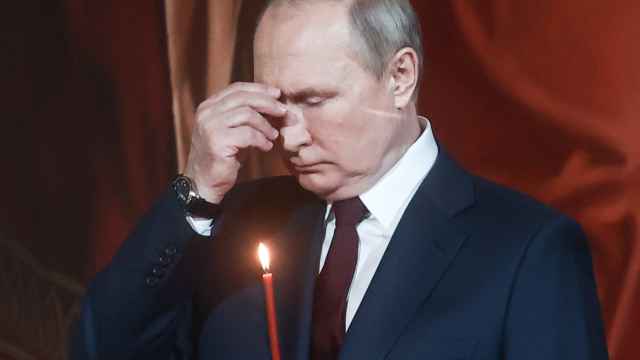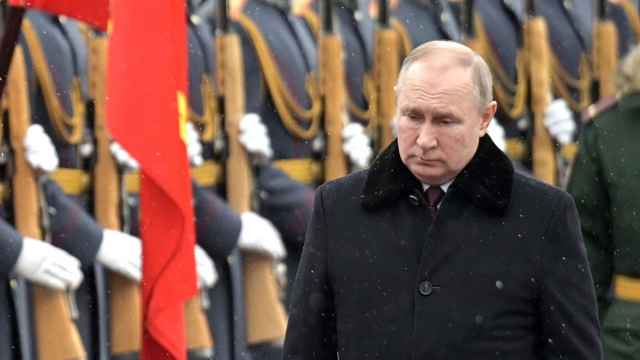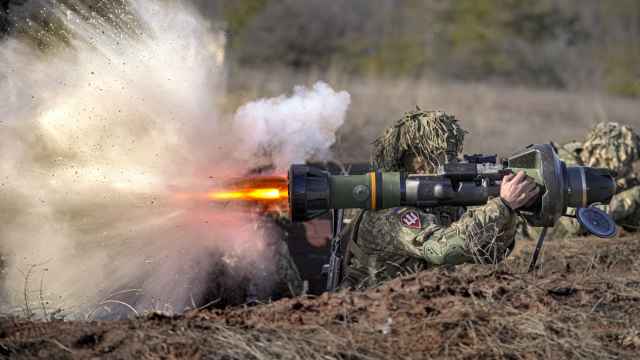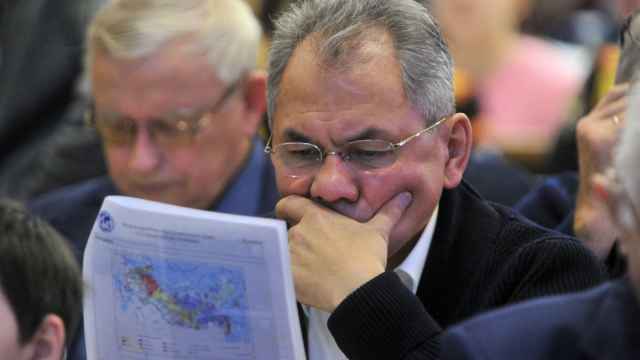Five days into its invasion of Ukraine, Russia appears to be shifting its tactics in response to unexpectedly ferocious Ukrainian resistance to its forces, analysts told The Moscow Times on Tuesday.
With Western intelligence assessments claiming Russian troops have so far failed to achieve their key objectives, experts suggested that Moscow might instead adopt much more brutal tactics aimed at crushing Ukrainian resistance, similar to previous campaigns in Chechnya and Syria.
Early on Tuesday morning, videos from Ukraine’s eastern second city of Kharkiv — which has put up a fierce defense despite being largely Russian-speaking and located just short of the border — showed a Russian rocket striking the city administration building, less than a day after footage appeared to document indiscriminate rocket fire striking civilian areas of the city.
The attacks on Kharkiv followed claims by the UK Defense Ministry that Russia was shifting to “siege” tactics against both Kharkiv, and Chernihiv, a northern border city that it has so far been unable to occupy.
“The Russian army is going to fight in the way it is equipped, prepared, and trained to do,” said Mark Galeotti, an analyst at the U.K.-based military think tank the Royal United Services Institute.
“Which is to say, massive use of long-range fire before any advance of any kind.”
The footage of missile strikes against Ukrainian cities comes after five days of Russian forces failing to take a single major city, even as they moved deep into Ukraine.
In the north and east, where the bulk of Ukraine’s army is positioned, the Russian advance has been slow, with reports of major casualties among Russian forces.
In the south, Russia has performed better, with forces invading from Russian-occupied Crimea taking the cities of Melitopol and Berdyansk, and reportedly encircling Kherson.
However, experts suggested that the Russians’ habit of sending unprotected armored columns deep into Ukrainian territory, along with the deployment of the RosGvardiya National Guard — a gendarmerie primarily used for law enforcement at home — in the vanguard may indicate that the Russians expected far less Ukrainian resistance than ultimately materialized.
“Clearly, there was an unrealistic idea among Russian military planners that the Ukrainian state was illegitimate, and would fracture at the first push,” said Galeotti.
Logistics have arisen as a chronic issue for the Russian forces, as Ukrainian troops have destroyed supply convoys.
In one widely circulated video, which The Moscow Times has not verified, a Ukrainian motorist slows down beside a broken-down Russian armored personnel character and jokingly offers to tow the crew back to Russia.
“Your lot are surrendering well,” the motorist says.
“Worst still ahead”
The Ukrainian Defense Ministry claims to have killed almost 6,000 Russian troops, a number that cannot be verified and may be exaggerated. Russia has admitted an unspecified number of casualties, and banned Russian media from reporting on the war using anything other than official sources.
“The initial Russian operation was premised on terrible assumptions about Ukraine’s ability and will to fight,” Michael Kofman, a Russian military analyst at the CNA in Washington D.C. who was among the first to predict a full-scale invasion of Ukraine, wrote on Twitter.
According to Kofman, Russia was initially aiming for a quick strike on Kyiv to decapitate the Ukrainian leadership. Having failed to achieve that, it is likely to shift towards alternative, bloodier tactics.
“Sadly, I expect the worst is still ahead, and this war could get a lot more ugly,” he said.
There is some fragmentary evidence suggesting that senior Russian figures are irritated with the halting campaign.
The U.S.’s NBC News reported Tuesday that American intelligence believes Putin is “frustrated” with the progress of the Ukrainian campaign, and “directing unusual bursts of anger” at his inner circle over the strength of Ukrainian resistance, and the unity of the outside world’s condemnation of his move.
In a message posted to his Telegram channel Sunday, Chechen leader Ramzan Kadyrov, whose troops have played a major role in the invasion, demanded a harsher approach to the invasion.
“I don’t understand why we’re still using kid gloves with the Banderites,” Kadyrov wrote, using a widespread Russian propaganda slur for Ukrainian nationalists.
“The time has come to take concrete moves, and begin a full-scale operation in all directions across Ukrainian territory,” he added.
Analysts have suggested that such comments could set the stage for Russia to escalate its offensive against Ukraine, adopting tactics seen during Moscow’s intervention in Syria, and its war against secessionists in Kadyrov’s native Chechnya.
The Chechen capital Grozny was razed to the ground in two wars from 1994-96, and 1999-2000.
Aleppo, Syria’s largest city, received the same treatment during Russia’s intervention from 2015 to protect the regime of Bashar al-Assad.
With Russia having emerged the victor from both interventions, there is worry that the same modus operandi might be in play.
“The Russian army today is not the same as in the year 2000,” said Galeotti. “But it is going back to basics.”
A Message from The Moscow Times:
Dear readers,
We are facing unprecedented challenges. Russia's Prosecutor General's Office has designated The Moscow Times as an "undesirable" organization, criminalizing our work and putting our staff at risk of prosecution. This follows our earlier unjust labeling as a "foreign agent."
These actions are direct attempts to silence independent journalism in Russia. The authorities claim our work "discredits the decisions of the Russian leadership." We see things differently: we strive to provide accurate, unbiased reporting on Russia.
We, the journalists of The Moscow Times, refuse to be silenced. But to continue our work, we need your help.
Your support, no matter how small, makes a world of difference. If you can, please support us monthly starting from just $2. It's quick to set up, and every contribution makes a significant impact.
By supporting The Moscow Times, you're defending open, independent journalism in the face of repression. Thank you for standing with us.
Remind me later.







